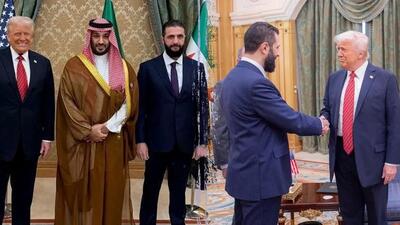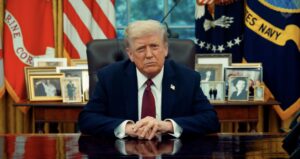
| Published June 29, 2025
In a surprising turn of geopolitical strategy, the Biden-Trump transitional White House has been quietly encouraging Syria’s interim government to pursue normalization with Israel—an unprecedented diplomatic maneuver given decades of hostility. Behind closed doors, U.S. envoys and Arab intermediaries are reportedly urging Syrian leader Ahmed al-Sharaa to join the Abraham Accords framework, as Washington leverages lifted sanctions and regional incentives to reshape the post-war Middle East. While the talks remain unofficial and cautious, the implications are far-reaching: a potential thaw between two historic enemies, brokered under the radar of mainstream media and without full public scrutiny.
🕊️ Context: Quiet (but Real) Syria–Israel Talks
-
Since the fall of Assad in December 2024, Syria’s interim leader Ahmed al‑Sharaa—formerly an Islamist rebel—has signaled a pragmatic shift. He’s engaged in indirect talks with Israeli counterparts via U.A.E. mediation to calm border tensions.
-
U.S. Special Envoy Thomas Barrack raised the American flag in Damascus in May and publicly confirmed “quiet talks” and even direct, face‑to‑face discussions focused on non‑aggression, borders, and security cooperation.
⚠️ Claims & Biases
-
Main claim: The White House (Trump administration) is “pressuring” Syria to normalize relations with Israel and join the Abraham Accords.
-
It cites a White House press briefing where Karoline Leavitt quoted Trump meeting “President Sharaa” in Riyadh and urging normalization.
-
It asserts that envoys like Barrack are applying “pressure” and failing to address human rights abuses by HTS-led government forces.
-
Caveat: ZeroHedge is a known partisan platform with opinionated analysis and selective framing. Its tone tends toward sensationalism.
✅ What the Broader Reporting Reveals
U.S. Policy Shift & Sanctions
-
In May 2025, Trump lifted U.S. sanctions on Syria, the first such move in years.
-
The White House view: Syria’s new government deserves a chance, with groundwork laid for eventual normalization with Israel
Israeli Engagement
-
Direct talks have taken place in southern Syria, focusing primarily on border security rather than full normalization
-
Leaders like Netanyahu have remained mostly quiet officially, though Israeli media and experts see strategic openings, especially post-Gaza conflict .
Preconditions & Public Statements
-
Al‑Sharaa reportedly supports normalization in principle, conditional on halting airstrikes, Israeli withdrawal from Syrian territory (especially the Golan Heights), and guarantees of Syrian unity.
-
Accountability for human rights and ethnic/religious minorities within Syria remains a major blind spot in messaging thus far .
White House Pressure and Backchannel Diplomacy
After years of conflict and diplomatic isolation, the U.S. is now re-engaging Syria with a clear message: normalize ties with Israel and step into the new regional order. According to ZeroHedge and The Times, President Trump met Syria’s transitional leader, Ahmed al-Sharaa, during a summit in Riyadh. During their meeting, Trump reportedly urged Sharaa to begin the normalization process under the Abraham Accords, a U.S.-brokered initiative originally designed to strengthen Arab-Israeli cooperation.
The U.S. followed this diplomatic overture by easing longstanding economic sanctions—an act described by Trump as “an honor,” signaling a major policy shift from prior administrations. In May, U.S. envoy Thomas Barrack raised the American flag over the Damascus residence, a symbolic move highlighting improved relations and deeper engagement.
Syria’s New Stance: Cautious Openness
Sharaa, who took power after the collapse of the Assad regime, has thus far adopted a pragmatic tone. In interviews and indirect statements through Gulf intermediaries, Sharaa has expressed conditional openness to talks with Israel—on the condition that Israeli airstrikes cease and the issue of the Golan Heights is addressed. Syrian officials have also emphasized maintaining sovereignty and national unity as prerequisites for any formal agreement.
Despite Syria’s history of deep resistance to Israeli recognition, Sharaa’s openness marks a break from decades of hardline policy. Sources from Reuters suggest that U.A.E.-backed talks are already underway, with direct security discussions occurring near the Golan border.
 Resulting Effects
Resulting Effects
1. Realignment of Regional Power Blocs
Syria’s potential shift toward normalization is already altering regional calculations. Traditional alliances—such as Syria’s ties with Iran and Hezbollah—are under strain as Damascus repositions itself toward Gulf-backed diplomacy and U.S. engagement.
2. Strengthening of the Abraham Accords Framework
If successful, Syria’s inclusion would mark the most significant expansion of the Abraham Accords yet, giving the framework greater legitimacy and momentum across the Arab world—especially in the Levant, where normalization was once unthinkable.
3. Reduced Military Tensions Along the Israel-Syria Border
Preliminary security talks have already resulted in fewer reported airstrikes in southern Syria. Israeli sources suggest de-escalation has been coordinated through backchannels, easing fears of another major cross-border conflict.
4. Internal Risk for Syria’s Interim Government
Domestically, Sharaa’s openness to Israel has drawn criticism from hardliners, including remnants of HTS and Iranian-aligned militias. This could create internal instability or even attempts to derail talks through sabotage or insurgency.
5. Broader U.S. Leverage in the Region
The U.S. regaining diplomatic footing in Syria gives Washington an edge over Russia and Iran in post-war reconstruction, intelligence partnerships, and counterterrorism coordination.
 Bottom Line:
Bottom Line:
The quiet talks between Syria and Israel, driven by U.S. pressure and regional mediation, signal more than just a diplomatic overture—they mark a potential turning point in Middle East geopolitics. If Syria joins the Abraham Accords, it could reshape alliances, reduce long-standing hostilities, and elevate Washington’s influence in a region long dominated by proxy wars and foreign interference. But the path forward is fraught with challenges: domestic resistance within Syria, unresolved territorial disputes, and the deep scars of recent conflict. Whether this effort leads to genuine peace or a fragile arrangement held together by external incentives remains to be seen. For now, the world watches as a former adversary weighs the cost—and the opportunity—of reconciliation.





Be the first to comment